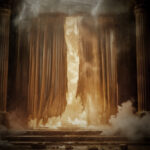“That’s the thickest book I’ve ever seen!”
My friend and I were discussing differences between Christianity and Mormonism, he’d just pulled the Mormon “Quad” out of his locker, and I was amazed at its heft. Roughly two and a half inches thick, this collection of Mormon scriptures includes the KJV Bible, the Book of Mormon, the Doctrine and Covenants, and the Pearl of Great Price.
As we continued our conversation, one thing was clear: the Bible may have been bound alongside the other Mormon scriptures, but it didn’t carry the same authority.
What Do Mormons Believe About the Bible?
Article 8 of the Mormon Articles of Faith reads, “We believe the Bible to be the word of God as far as it is translated correctly; we also believe the Book of Mormon to be the word of God.”
Mormonism doesn’t view the Bible and the Book of Mormon equally. The Bible’s status as God’s Word is relativized by the phrase “as far as it is translated correctly.” The Book of Mormon is the word of God; the Bible merely contains the Word of God among the bits that are correctly translated.
Mormonism doesn’t view the Bible and the Book of Mormon equally.
Of course, this raises a question: “What does ‘translated correctly’ mean?” Mormons, or Latter-day Saints (LDS), understand that clause in various ways, but regardless, it opens the door to doubting the truthfulness of the Bible.
In talking to Mormons, I’ve encountered several objections to the authority and inerrancy of the Bible. Some Mormons understand all modern translations of the Bible to be corrupt. Since the translators belong to apostate churches condemned by Joseph Smith, the translations themselves are artifacts of those apostate churches.
Others suggest “translated correctly” refers to a corrupted transmission of the text of Scripture through history. With arguments that sound similar to Bart Ehrman’s critique of the text, many Mormons assume the Bible came into the 21st century the way a message gets distorted when a bunch of eighth graders play the telephone game. The original text of Scripture has simply been lost in the dust of history. As the LDS apostle Neal Maxwell suggested, “By faulty transmission, many ‘plain and precious things’ were ‘taken away’ or ‘kept back’ from reaching what later composed our precious Holy Bible.”
Maxwell is repeating what former LDS prophets and apostles all the way back to Joseph Smith have suggested. Smith himself advanced both criticisms (errors in translation and transmission): “I believe the Bible as it read when it came from the pen of the original writers; ignorant translators, careless transcribers, or designing and corrupt priests have committed many errors.”
The Bible and the Great Apostasy
It’s important to remember that in Mormon theology, errors in the Bible aren’t just products of random translation and transmission. The church—which apostatized immediately after the time of the apostles, according to Mormons—actively corrupted Scripture to suit its own teachings. Smith even enshrined this understanding into the Book of Mormon: in 1 Nephi 13, an angel warns Nephi of the church’s apostasy and the Bible’s corruption:
Thou seest the formation of that great and abominable church, which is most abominable above all other churches; for behold, they have taken away from the gospel of the Lamb many parts which are plain and most precious. . . . And all this have they done that they might pervert the right ways of the Lord, that they might blind the eyes and harden the hearts of the children of men. Wherefore, thou seest that after the book hath gone forth through the hands of the great and abominable church, that there are many plain and precious things taken away from the book, which is the book of the Lamb of God. (1 Nephi 13:26–28)
For this reason, many Mormons assume Scripture is corrupted wherever it contradicts LDS teaching. The Bible, then, always functionally stands under the church’s teaching and the other LDS scriptures. Mormons embrace the Bible as God’s Word only when it can be reinterpreted to support their theological agenda.
Grass Withers and Flower Fades
Mormons may claim to revere the Bible, but it remains for them a corrupted book needing correction—correction only through the restoration of the true church by Joseph Smith.
Mormons may claim to revere the Bible, but it remains for them a corrupted book needing correction.
In response to Mormon skepticism, Christians interested in exploring the translation and transmission of the Bible can find ample scholarly and apologetic works to bolster their confidence in Scripture’s veracity and truthfulness.
But even more, we can trust Scripture’s testimony about itself. The Scriptures of the Old and New Testaments have been breathed out by God himself (2 Tim. 3:16). And his Word isn’t discarded quite as easily as Joseph Smith suggested. God promised his Word will endure: “The grass withers, the flower fades, but the word of our God will stand forever” (Isa. 40:8).
“The Most Practical and Engaging Book on Christian Living Apart from the Bible”
 “If you’re going to read just one book on Christian living and how the gospel can be applied in your life, let this be your book.”—Elisa dos Santos, Amazon reviewer.
“If you’re going to read just one book on Christian living and how the gospel can be applied in your life, let this be your book.”—Elisa dos Santos, Amazon reviewer.
In this book, seasoned church planter Jeff Vanderstelt argues that you need to become “gospel fluent”—to think about your life through the truth of the gospel and rehearse it to yourself and others.
We’re delighted to offer the Gospel Fluency: Speaking the Truths of Jesus into the Everyday Stuff of Life ebook (Crossway) to you for FREE today. Click this link to get instant access to a resource that will help you apply the gospel more confidently to every area of your life.


































